CADILLAC ELDORADO 1997 10.G Owners Manual
Manufacturer: CADILLAC, Model Year: 1997, Model line: ELDORADO, Model: CADILLAC ELDORADO 1997 10.GPages: 361, PDF Size: 22.85 MB
Page 171 of 361
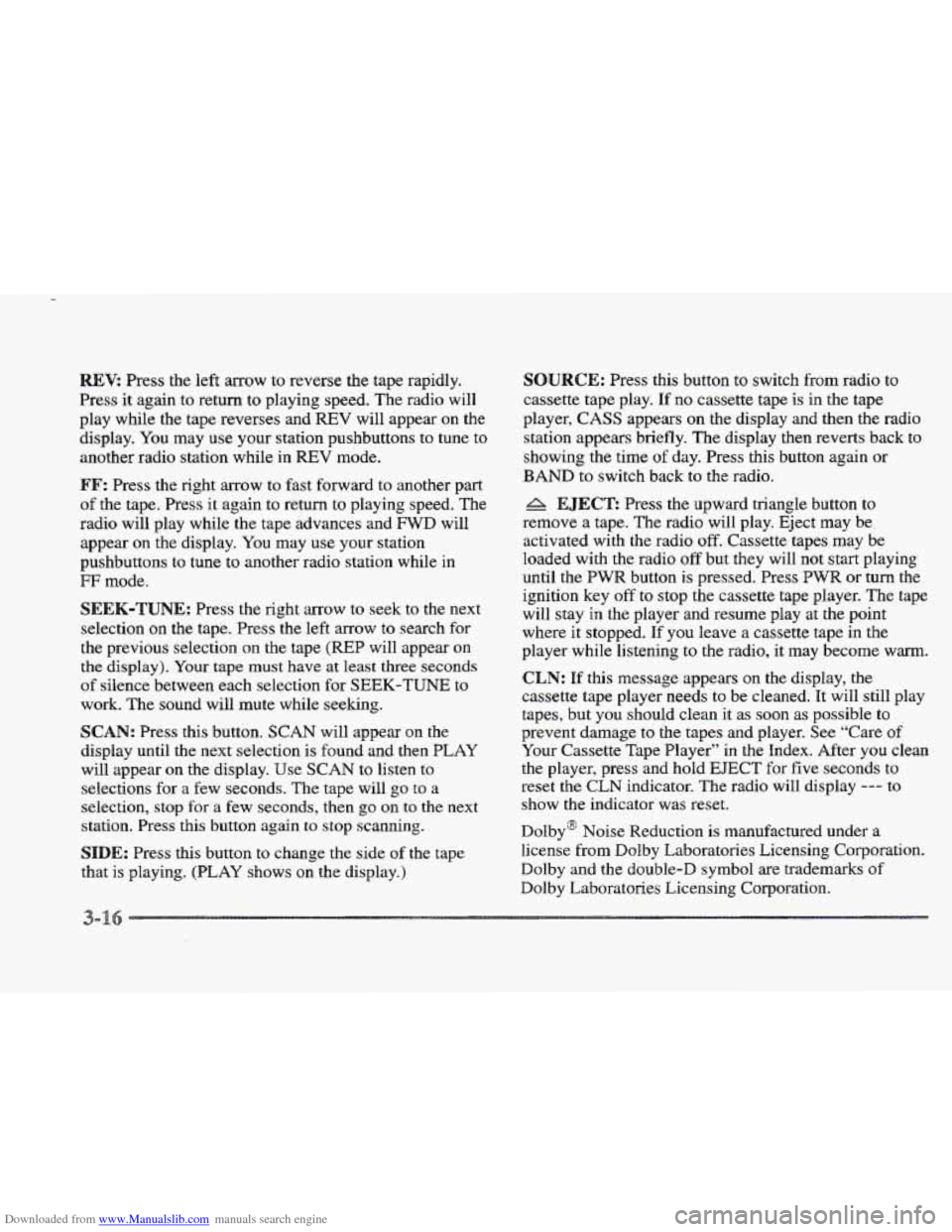
Downloaded from www.Manualslib.com manuals search engine REVi Press the left arrow to reverse the tape rapidly.
Press it again to return
to playing speed. The radio will
play while
the tape reverses and REV will appear on the
display. You may
use your station pushbuttons to tune to
another radio station while in
REV mode.
FF: Press the right arrow to fast forward to another part
of the tape. Press it again to return to playing speed. The
radio will play while
the tape advances and FWD will
appear on the display. You may
use your station
pushbuttons to tune to another radio station while in
g;F mode.
SEEK-TUNE: Press the sight ~QW to seek to the next
selection on the tape. Press the left
arrow to search for
the previous selection on
the tape (REP will appear on
the display). Your tape must have at least three seconds
of silence between each selection for SEEK-TUNE to
work. The sound will mute while seelung.
SCAN: Press this button. SCAN will appear on the
display until the next selection is found and then PLAY
will appear
on the display. Use SCAN to listen to
selections for a few seconds. The tape will
go to a
selection, stop
for a few seconds, then go on to the next
station. Press this button again to stop scanning.
SIDE: Press this button to change the side of the tape
that
is playing. (PLAY shows on the display.)
SOURCE: Fress this button to switch from radio to
cassette tape play.
If no cassette tape is in the tape
player,
CASS appears on the display and then the radio
station appears briefly. The display then reverts back to
showing the time
of day. Press this button again or
BAND to switch back to the radio.
A EJECT: Press the upward triangle button to
remove a tape. The radio will play. Eject may be
activated with
the radio off. Cassette tapes may be
loaded with the radio
off but they will not start playing
until
the PWR button is pressed. Press PWW or turn the
ignition key
off to stop the cassette tape player. The tape
will stay in the player and resume play
at the point
where
it stopped. If you leave a cassette tape in the
player while listening to the radio, it may become warm.
CLN: If this message appears on the display, the
cassette tape player needs to be cleaned. It will still play
tapes, but you should clean it as soon as possible to
prevent damage to the tapes and player. See “Care of
Your Cassette Tape Player”
in the Index. After you clean
the player, press and hold
EJECT for five seconds to
reset the CLN indicator. The radio will display --- to
show the indicator was reset.
Dolby@ Noise Reduction is manufactured under a
license from Dolby Laboratories Licensing Corporation.
Dolby and the double-D symbol are trademarks
of
Dolby Laboratories Licensing Corporation.
Page 172 of 361
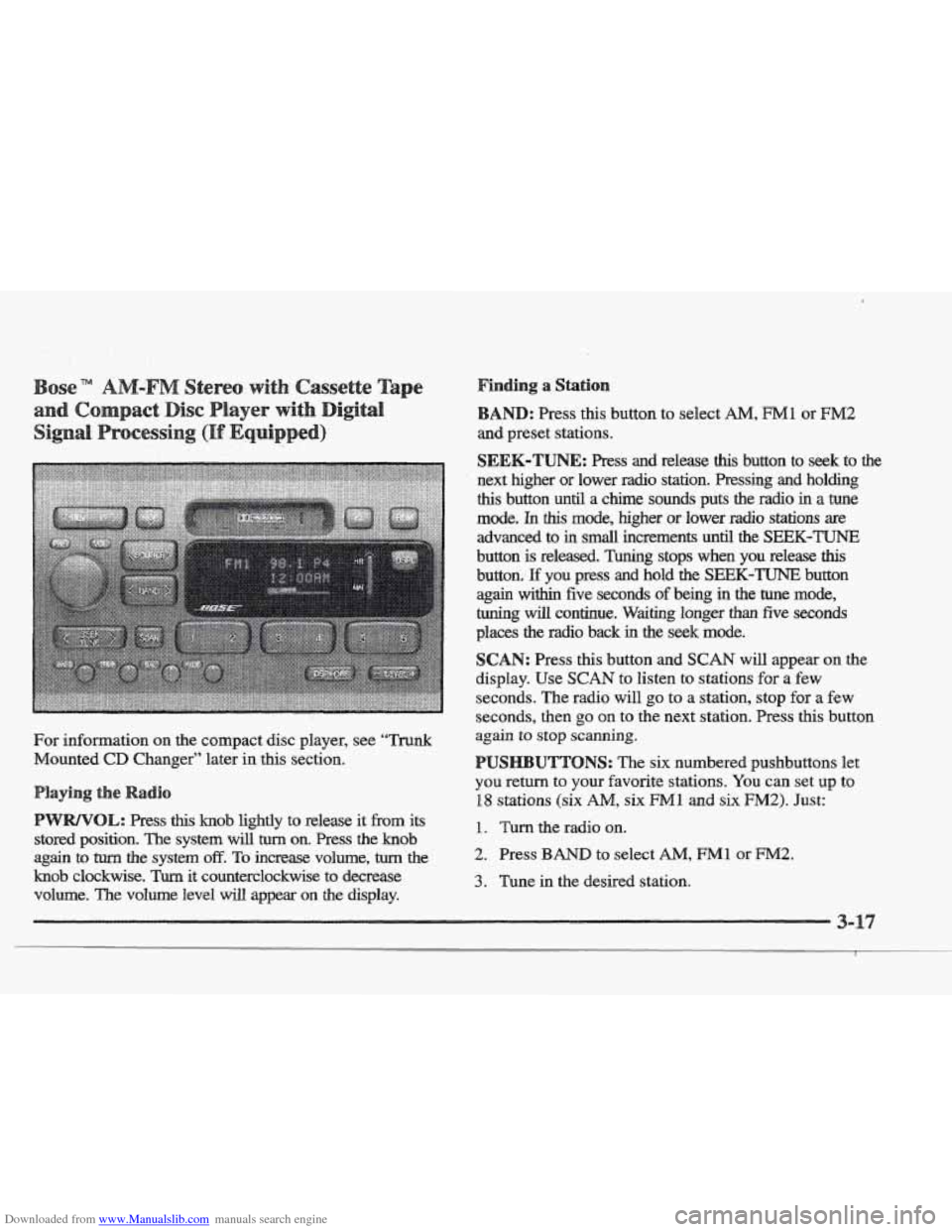
Downloaded from www.Manualslib.com manuals search engine For information on the compact disc player, see ‘‘Trunk
Mounted CD Changer” later in this section.
this knob lightly to release it from its
stored position.
The system will turn on. Press the knob
again
to turn the system off. To increase volume, turn the
knob clockwise. Turn it counterclockwise to decrease
volume. The volume level
will appear on the display.
Finding a Station
: Press this button to select AM, FM1 or EM2
SEEK-TUNE: Press and reiease this button to seek to the
next higher or lower radio station. Pressing and holding
this button until a chime sounds puts the radio in a tune
mode. In this mode, higher or lower radio stations are
advanced to
in small increments until the SEEK-TUNE
button is released. Tuning stops when you release this
button. E you press and hold the SEEK-TUNE button
again within five seconds of being in the tune mode,
tuning
will continue. Waiting longer than five seconds
places
the radio back in the seek mode.
SCAN: Press this button and SCAN will appear on the
display. Use
SCAN to listen to stations for a few
seconds. The radio will
go to a station, stop for a few
seconds, then
go on to the next station. Press this button
again to
stop scanning.
UTTONS: The six numbered pushbuttons let
you return to your favorite stations. You can set up to
18 stations (six AM, six Ml and six F”2). Just:
1. Turn the radio on.
2. Press BAND to select AM, FM1 or FM2.
3. Tune in the desired station.
Page 173 of 361
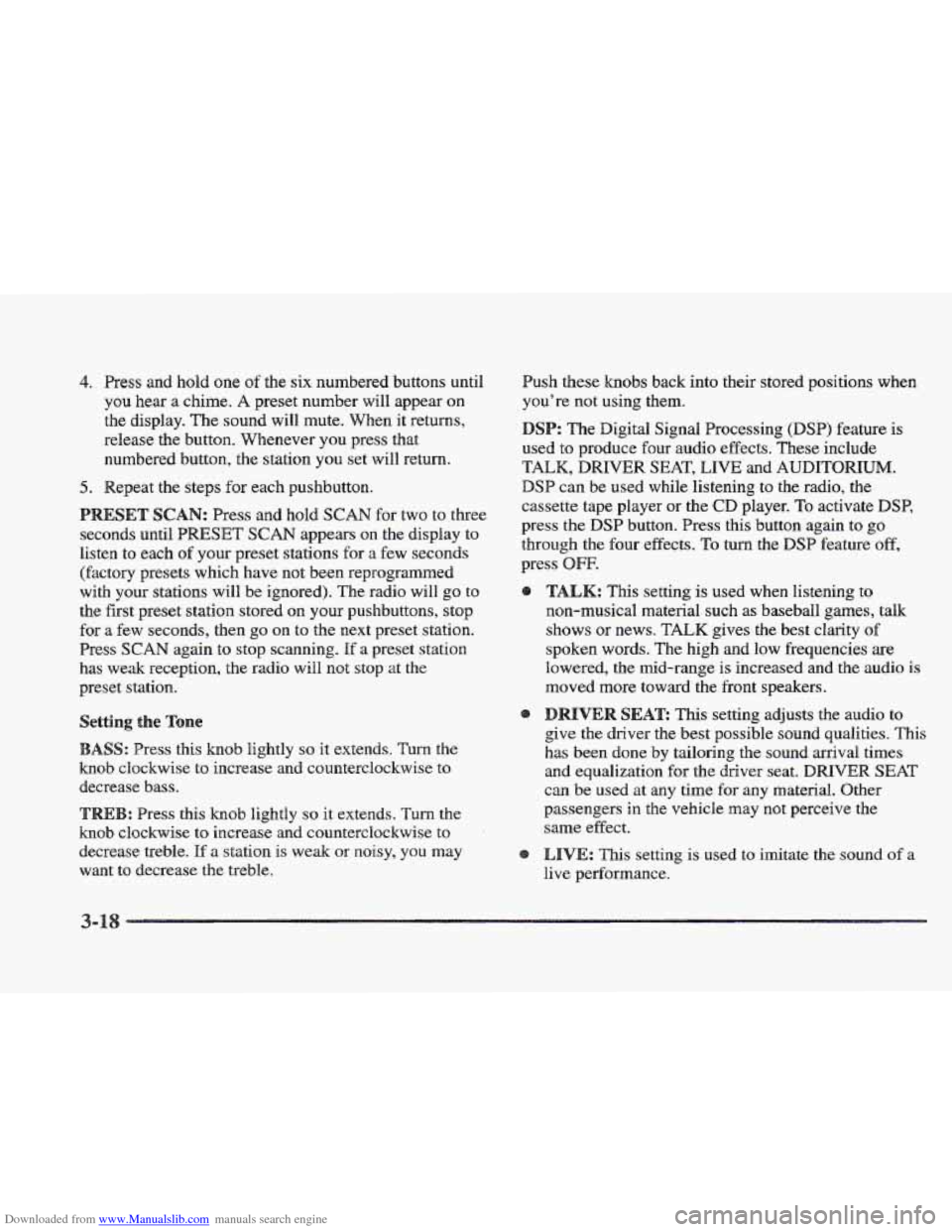
Downloaded from www.Manualslib.com manuals search engine 4. Press and hold one of the six numbered buttons until
you hear a chime.
A preset number will appear on
the display. The sound will mute. When it returns,
release the button. Whenever you press that
numbered button, the station
you set will return.
5. Repeat the steps for each pushbutton.
seconds until PRESET
SCAN appears on the display to
listen
to each of your preset stations for a few seconds
(Factory presets which have not been reprogrammed
with your stations will be ignored). The radio
will go to
the first preset station stored on your pushbuttons, stop
for a few seconds, then go on to the next preset station.
Press
SCAN again to stop scanning. If a preset station
has weak reception, the radio
will not stop at the
preset station.
ESET SCAN: Press and hold SCAN for two to three
ASS: Press this knob lightly so it extends. Turn the
knob clockwise to increase and counterclockwise to
decrease
bass.
T : Press this knob lightly so it extends. Turn the
knob clockwise to increase and counterclockwise to
decrease treble.
If a station is weak or noisy, you may
want to decrease the treble. Push
these knobs back into their stored positions when
you're not using them.
SP: The Digital Signal Processing (DSP) feature is
used to produce four audio effects. These include
TALK, DRIVER SEAT, LIVE and AUDITORIUM.
DSP can be used while listening to the radio, the
cassette tape player or the CD player. To activate DSP,
press the DSP button. Press this button again to go
through the
four effects. To turn the DSP feature off,
press OFF.
TALK: This setting is used when listening to
non-musical material such as baseball games, talk
shows
or news. TALK gives the best clarity of
spoken words. The high and low frequencies are
lowered, the mid-range is increased and the audio is
moved more toward the front speakers.
DRIVER SEAE This setting adjusts the audio to
give
the driver the best possible sound qualities. This
has been done by tailoring the sound arrival times
and equalization
for the driver seat. DRIVER SEAT
can be used at
any time for any material. Other
passengers
in the vehicle may not perceive the
same effect.
LIVE: This setting is used to imitate the sound of a
live performance.
Page 174 of 361
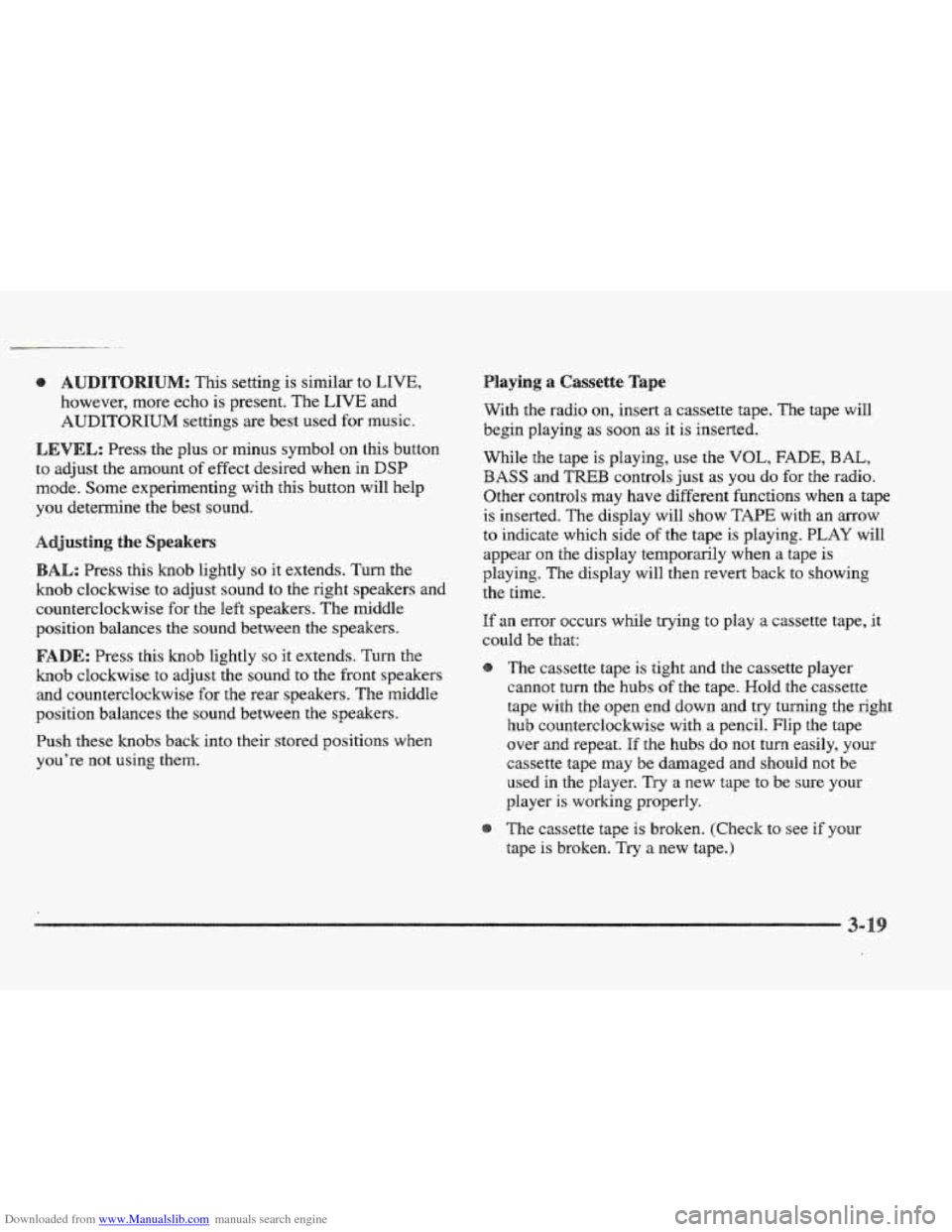
Downloaded from www.Manualslib.com manuals search engine UM: Ths setting is similar to LIVE,
however, more echo is present. The LIVE and
AUDITORIUM settings are best used for music.
LEVEL: Press the plus or minus symbol on this button
to adjust the amount
of effect desired when in DSP
mode. Some experimenting with this button will help
you determine the best sound.
usting the Speakers
AX,: Press this knob lightly so it extends. Turn the
knob clockwise to adjust sound to the right speakers and
counterclockwise for the left speakers. The middle
position balances the sound between
the speakers.
E: Press ths knob lightly so it extends. Turn the
knob clockwise
to adjust the sound to the front speakers
and counterclockwise
for the rear speakers. The middle
position balances the sound between
the speakers.
Push these knobs
back into their stored positions when
you’re
not using them.
laying a Cassette Tape
With the radio on, insert a cassette tape. The tape will
begin playing as
SOQII as it is inserted.
While
the tape is playing, we the VOL, FADE, BAL,
BASS and TREB controls just as you do for the radio.
Other controls
may have different functions when a tape
is inserted. The display will show
TAPE with an arrow
to indicate which side of the tape is playing. PLAY will
appear
on the display temporarily when a tape is
playing. The display will then revert back to showing
the time.
If an error occurs while trying to play a cassette tape, it
could be that:
The cassette tape is tight and the cassette player
cannot turn the hubs
of the tape. Hold the cassette
tape with the open end down and
try turning the right
hub counterclockwise with a pencil. Flip
the tape
over and repeat.
If the hubs do not turn easily, your
cassette tape may be damaged and should not be
used in the player. Try a new tape to be sure YQUI-
player is working properly.
The cassette tape is broken. (Check to see
if your
tape is broken.
Try a new tape.)
Page 175 of 361
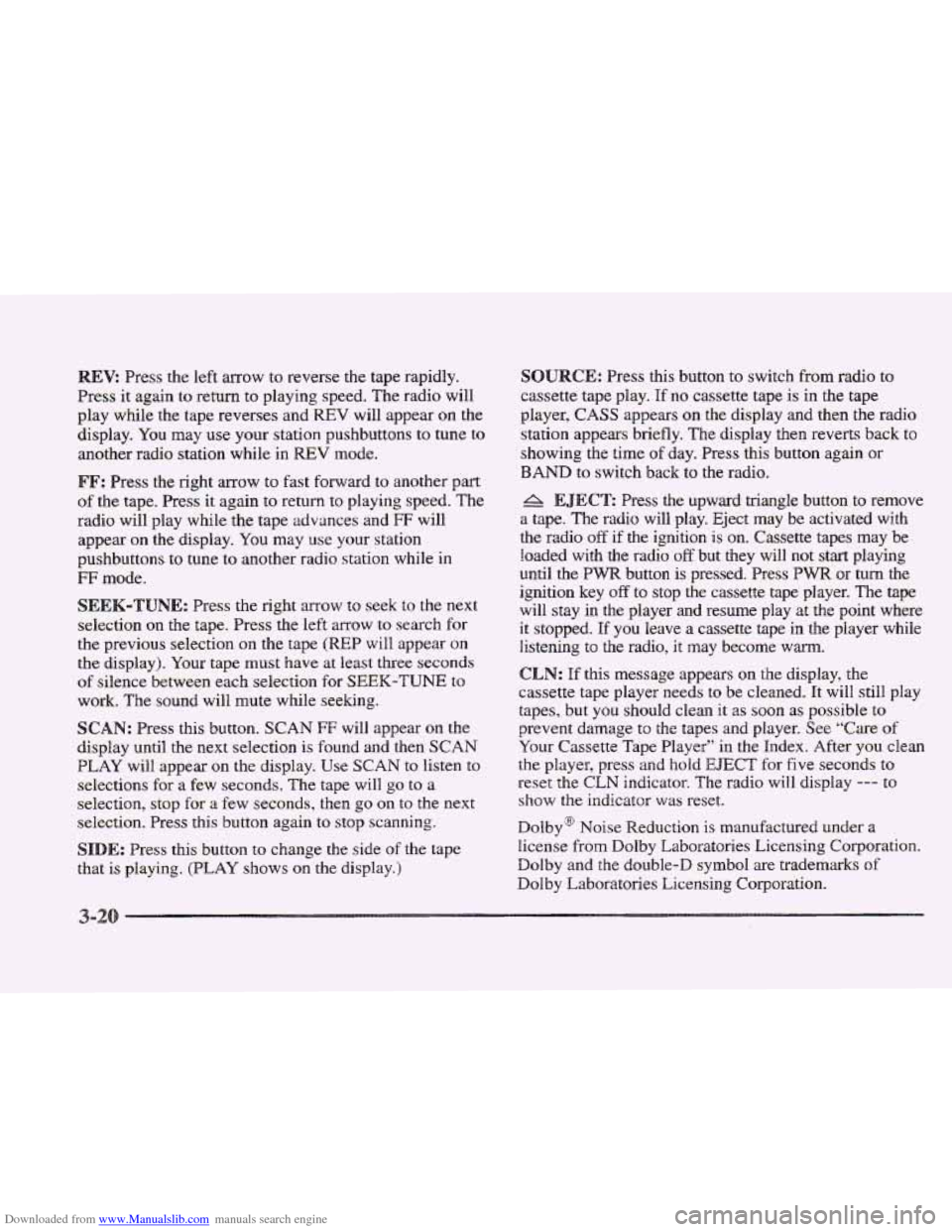
Downloaded from www.Manualslib.com manuals search engine Br: Press the left mow to reverse the tape rapidly.
Press it again
to return to playing speed. The radio will
play while the tape reverses and
REV will appear on the
display. You may use your station pushbuttons to tune to
another radio station while in
REV mode.
FF: Press the right arrow to fast forward to another part
of the tape. Press it again to return to playing speed. The
radio will play while
the tape advances and FF will
appear
on the display. You may ~lse your station
pushbuttons to tune to another radio station
while in
mode.
SEEK-TUNE: Press the right arrow to seek to the next
selection
on the tape. Press the left arrow to search for
the previous selection
on the tape (REP will appear on
the display). Your tape must have at least three
seconds
of silence between each selection for SEEM-TUNE to
work. The sound will mute while seeking.
SCAN: Press this button. SCAN FF will appear on the
display until the next selection
is found and then SCAN
PLAY will appear on the display. Use SCAN to listen to
selections for
a few seconds. The tape will go to a
selection, stop for
a few seconds, then go on to the next
selection. Press this button again to stop scanning.
SIDE: Press this button to change the side of the tape
that
is playing. (PLAY shows on the display.)
SOURCE: Press this button to switch from radio to
cassette tape play.
If no cassette tape is in the tape
player,
CASS appears on the display and then the radio
station appears
briefly. The display then reverts back to
showing the
time of day. Press this button again or
BAND to switch back to the radio.
A EJECT: Press the upward triangle button to remove
a tape. The radio will play. Eject may be activated with
the radio
off if the ignition is on. Cassette tapes may be
loaded with the radio
off but they will not start playing
until the PWR button is pressed. Press PWR or turn the
ignition key
off to stop the cassette tape player. The tape
will stay in
the player and resume play at the point where
it stopped.
If you leave a cassette tape in the player while
listening to the radio, it may become wm.
CLN: If this message appears on the display, the
cassette tape player needs to
be cleaned. It will still play
tapes, but you should clean
it as soon as possible to
prevent damage
to the tapes and player. See “Care of
Your Cassette Tape Player”
in the Index. After you clean
the player, press
and hold EJECT hr five seconds to
reset
the CLN indicator. The radio will display --- to
show the indicator was reset.
Dolby@
Noise Reduction is manufactured under a
license from Dolby Laboratories Licensing Corporation.
Dolby and the double-D symbol are trademarks of
Dolby Laboratories Licensing Corporation.
Page 176 of 361
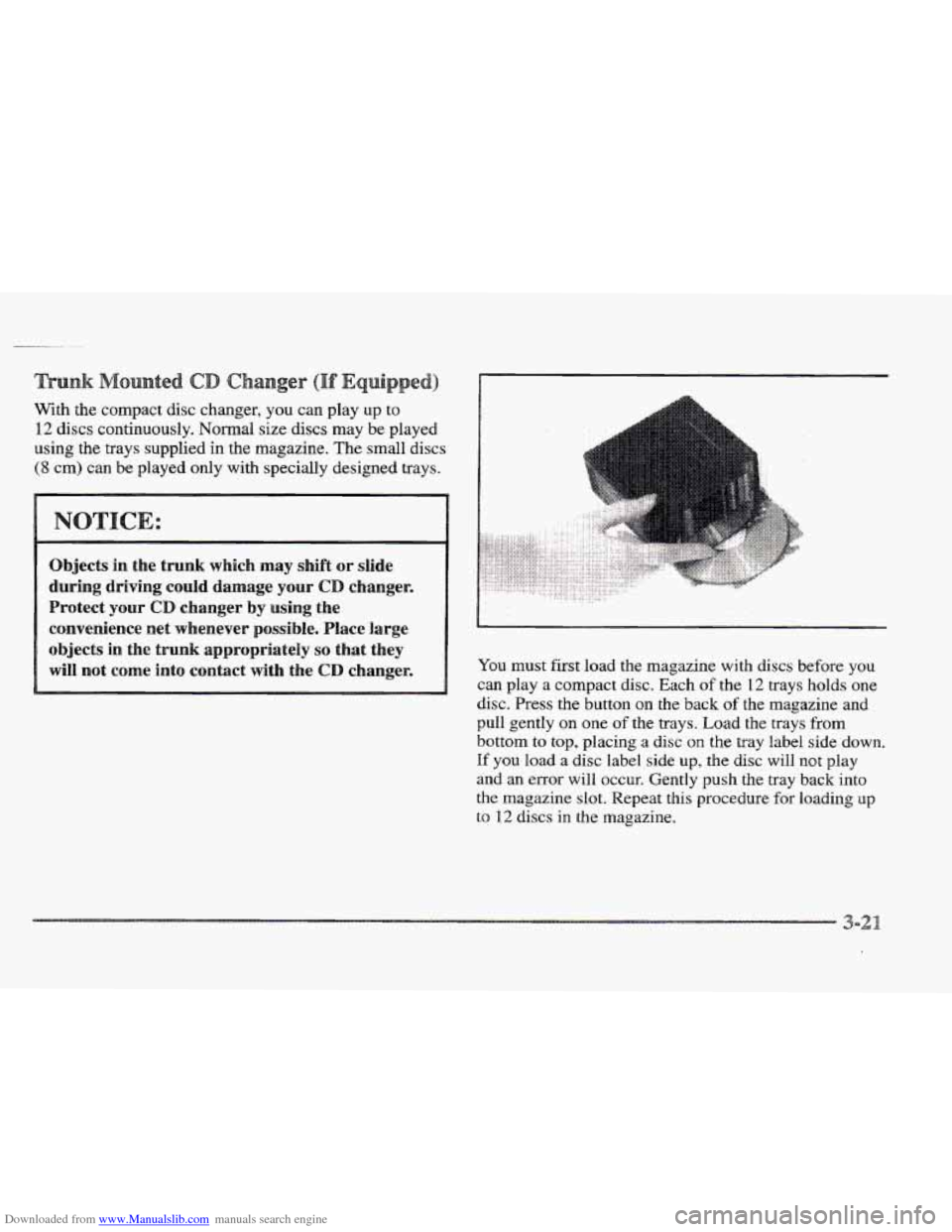
Downloaded from www.Manualslib.com manuals search engine .. .
te
With the compact disc changer, you can play up to
12 discs continuously. Normal size discs may be played
using the trays supplied in the magazine.
The small discs
(8 cm) can be played only with specially designed trays.
Objects in the trunk which may shift or slide
during driving could damage your
CD changer.
Protect your
CD changes by using the
convenience net whenever possible. Place large
objects in
the trunk appropriately so that they
will not
come into contact with the CD changer. You must first load the magazine with discs before you
can play a compact disc. Each of the 12 trays holds one
disc. Press the button on the back of the magazine and
pull gently
on one of the trays. Load the trays from
bottom to top, placing a disc on the tray label side down.
If you load a disc label side up, the disc will not play
and an error will occur. Gently push the tray back into
the magazine slot. Repeat this procedure for loading up
to 12 discs in the magazine.
Page 177 of 361
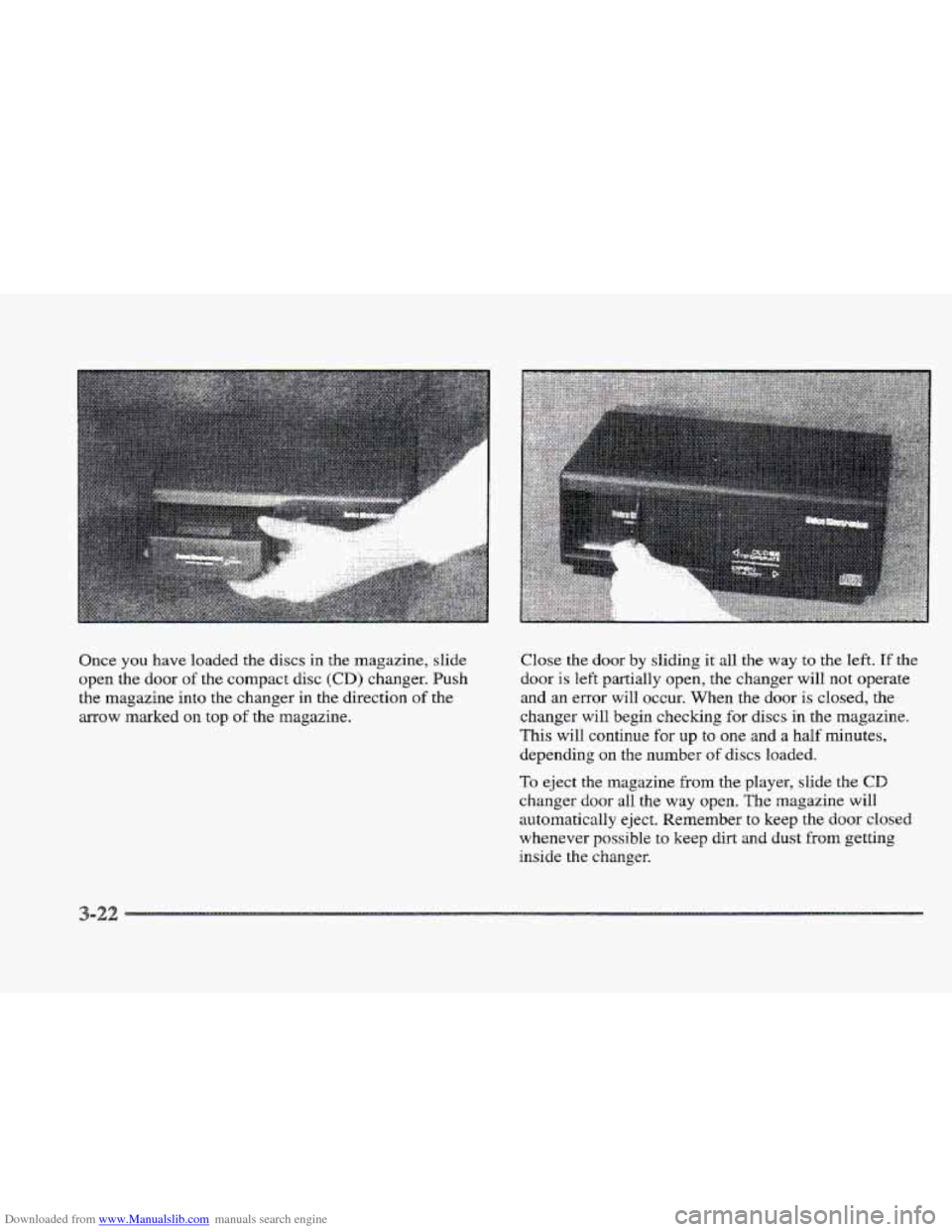
Downloaded from www.Manualslib.com manuals search engine Once you have loaded the discs in the magazine, slide
open the door of the compact disc
(CD) changer. Push
the magazine into the changer
in the direction of the
arrow marked on top of the magazine. Close
the door
by sliding it all the way to the left. If the
door
is left partially open, the changer will not operate
and an error will occur. When the door
is closed, the
changer will begin checking for discs in the magazine.
This will continue for up to one and a half minutes,
depending on the number
of discs loaded.
To eject the magazine from the player, slide the CD
changer door all the way open. The magazine will
automatically eject. Remember to keep the door closed
whenever
possible to keep dirt and dust from getting
inside the changer.
Page 178 of 361
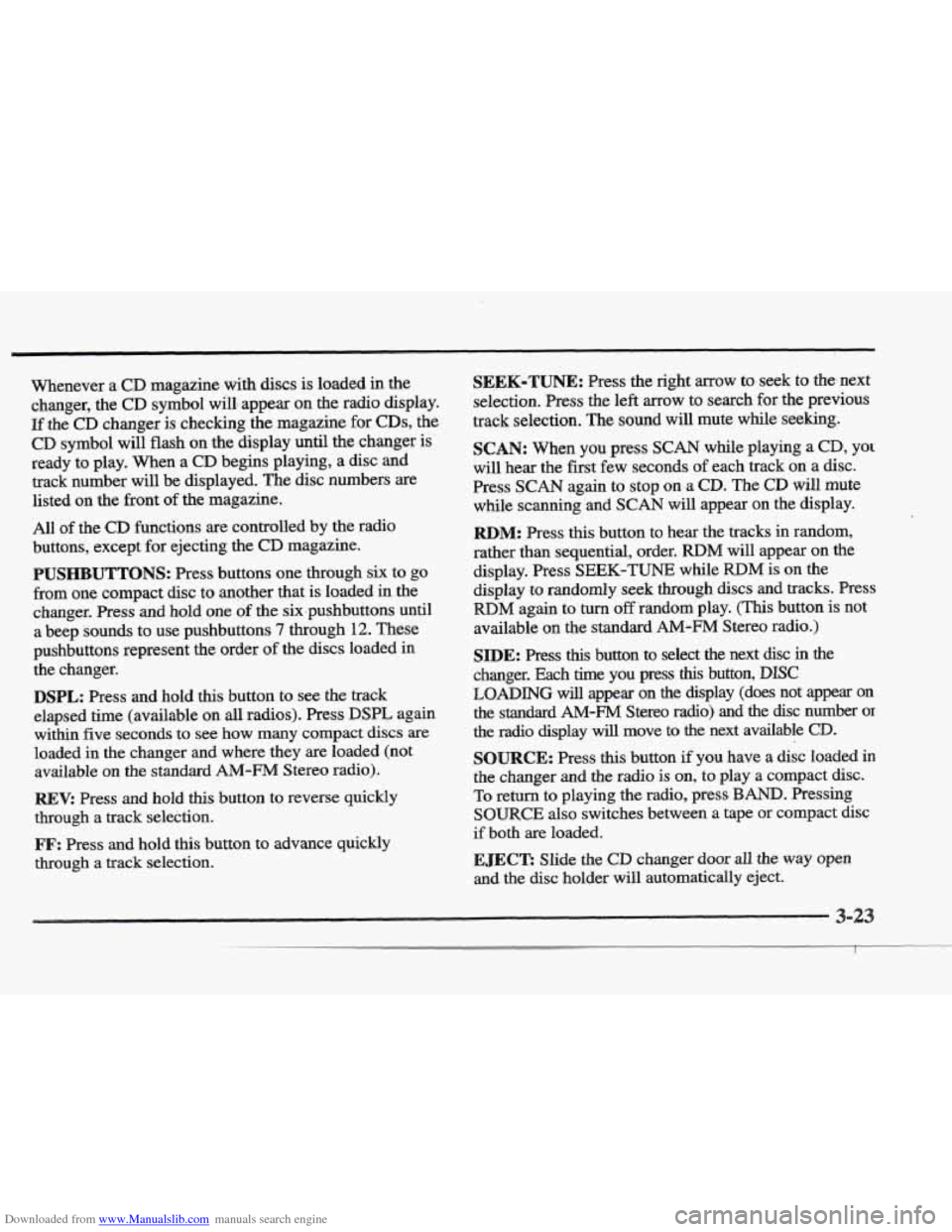
Downloaded from www.Manualslib.com manuals search engine Whenever a-CD magazine.with discs is loaded in the
changer, the
CD symbol will appear on the radio displ.ay.
If the CD changer is checking the magazine for CDs, the
CD symbol will flash on the display until the changer is
ready to play. When a
CD begins playing, a disc and
track number will be displayed. The disc numbers are
listed on the front
of the magazine.
All of the CD functions are controlled by the radio
buttons, except for ejecting the
CD magazine.
PUSHBUTTONS: Press buttons one through six to go
from one compact disc to another that is loaded in the
changer. Press and hold one
of the six,pushbuttons until
a beep sounds to use pushbuttons
7 through 12. These
pushbuttons represent the order
of the discs loaded in
the changer.
DSPL: Press and hold this button to see the track
elapsed time (available on all radios). Press DSPL again
within five seconds to see how many compact
discs are
loaded in the changer and where they are loaded (not
available on
the standard AM-FM Stereo radio).
]REV: Press and hold this button to reverse quickly
through a track selection.
FF: Press and hold this button to advance quickly
through a track selection.
SEEK-TUNE: Press the right arrow to seek to the,next
selection. Press the left arrow to search for the previous
track selection. The sound
will mute while seeking.
SCAN: When you press SCAN while playing a CD, yo[
will hear the first few seconds of each track on a disc.
Press
SCAN again to stop on a CD. The CD will mute
while scanning and
SCAN will appear on the display.
RDM: Press this button to hear the tracks in random,
rather than sequential, order.
RDM will appear on the
display. Press
SEEK-TUNE while RDM is on the
display to randomly seek through discs and tracks. Press
RDM again to turn off random play. (This button is not
available
on the standard AM-FM Stereo radio.)
SIDE: Press this button to select the next disc in the
changer. Each time you press
this button, DISC
LOADING will appear on the display (does not appear on
the standard
AM-FM Stereo radio) and the disc number or
the radio display will move to the next available CD.
SOURCE: Press this button if you have a disc loaded in
the changer and the radio
is on, to play a compact disc.
To return to playing the radio, press BAND. Pressing
SOURCE also switches between a tape or compact disc
if both are loaded.
EJECE Slide the CD changer door all the way open
and the disc holder will automatically eject.
3-23
~ I
Page 179 of 361
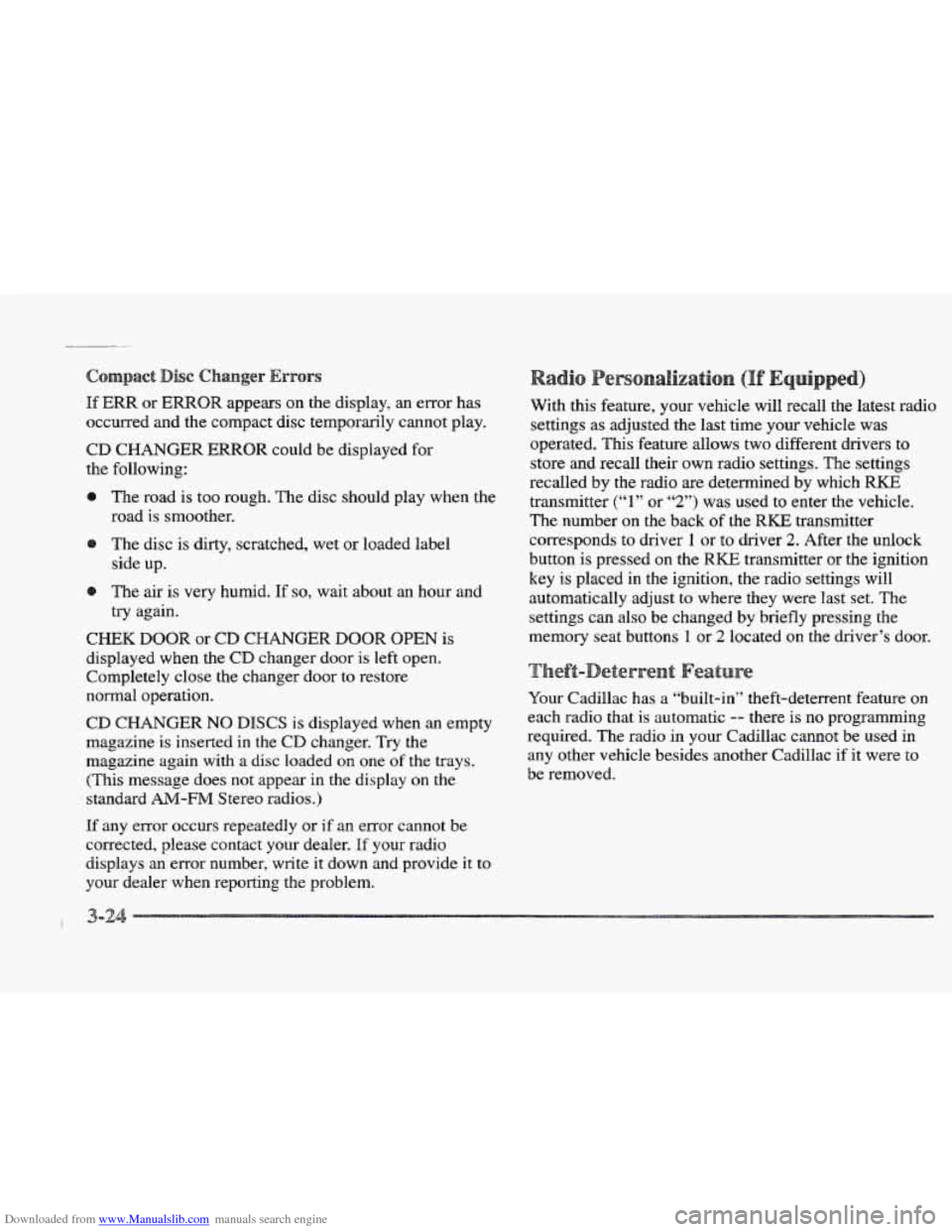
Downloaded from www.Manualslib.com manuals search engine If ERR or ERROR appears on the display, an error has
occurred
and the compact disc temporarily cannot play.
CD CHANGER ERROR could be displayed for
the following:
The road
is too rough. The disc should play when the
road
is smoother.
The disc is dirty, scratched, wet or loaded label
side up.
@ The air is very humid. If so, wait about an hour and
try again.
CHEK DOOR or CD CHANGER DOOR OPEN is
displayed when the CD changer door is left open.
Completely close
the changer door to restore
normal operation.
CD CHANGER NO DISCS is displayed when an empty
magazine is inserted
in the CD changer. Try the
magazine again with a disc loaded
on one of the trays.
(This message does not appear in
the display on the
standard AM-FM Stereo radios.)
If any error occurs repeatedly or if an error cannot be
corrected, please contact your dealer.
If your radio
displays
an error number, write it down and provide it to
your dealer when reporting
the problem. With this
feature, your vehicle will recall the latest radio
settings as adjusted the last time your vehicle was
operated.
This feature allows two different drivers to
store and recall their own radio settings. The settings
recalled
by the radio are determined by which RKE
transmitter (“1” or “2”) was used to enter the vehicle.
The number on the back
of the RICE transmitter
corresponds to driver
1 or to driver 2. After the unlock
button is pressed on the
RKE transmitter or the ignition
key is placed in the ignition, the radio settings
will
automatically adjust to where they were last set. The
settings can also be changed by briefly pressing the
memory seat buttons
1 or 2 located on the driver’s door.
Your Cadillac has a “built-in” theft-deterrent feature on
each radio that is automatic
-- there is no programming
required. The
radio in your Cadillac cannot be used in
any other vehicle besides another Cadillac if it were to
be removed.
Page 180 of 361
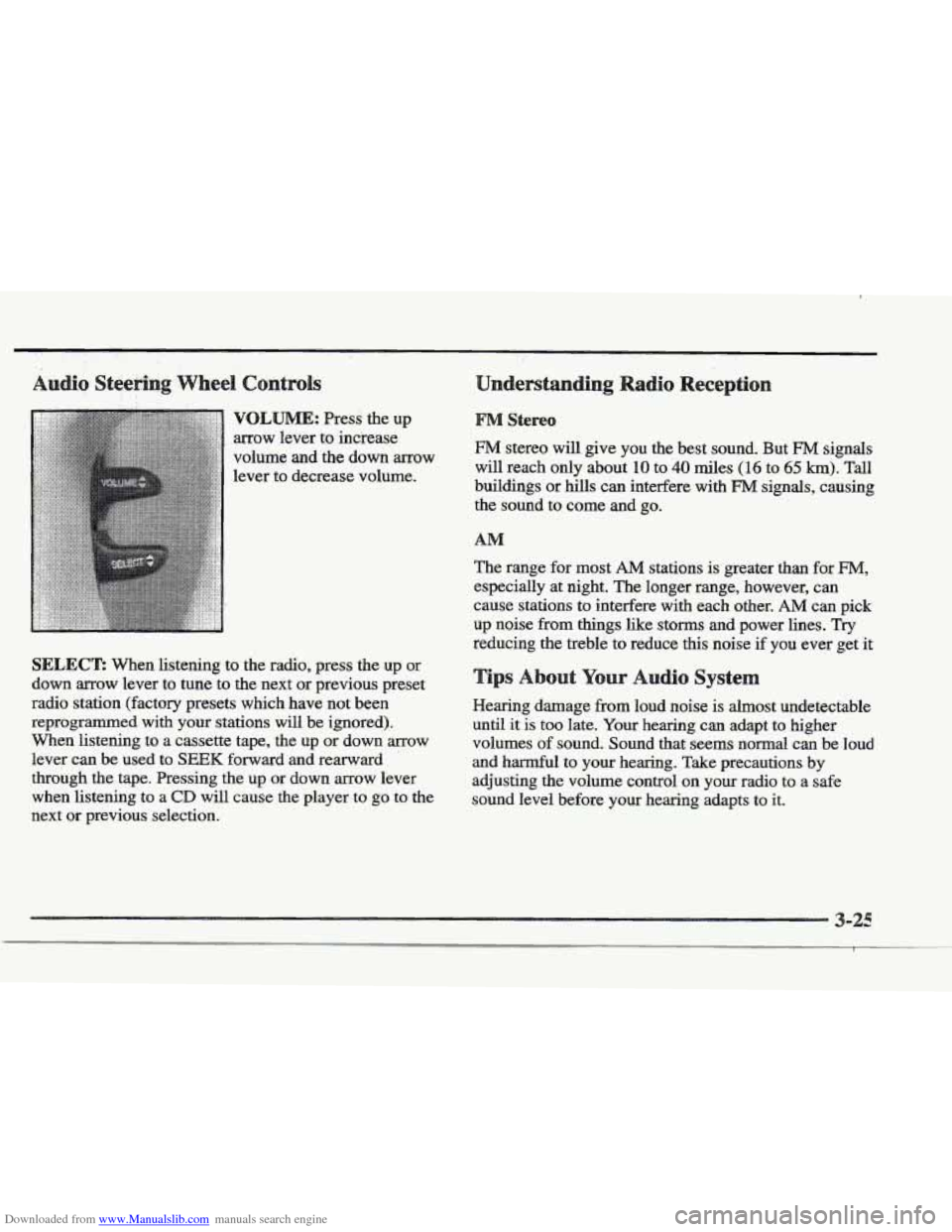
Downloaded from www.Manualslib.com manuals search engine VQLBJME: Press the up
arrow lever to increase
volume and the down arrow
lever to decrease volume.
SELECT: When listening to the radio, press the up or
down arrow lever to tune to the next or previous preset
radio station (factory presets which have not been
reprogrammed with your stations
will be ignored).
When listening to a cassette tape, the
up or down arrow
lever can be used to
SEEK forward and rearward
through the tape. Pressing the up
or down arrow lever
when listening to a
CD will cause the player to go to the
next or previous selection.
§&!reo
FM stereo will give you the best sound. But FM signals
will reach only about 10 to 40 miles (1 6 to 65 km). Tall
buildings or hills can interfere with
FM signals, causing
the sound to come
and go.
The range for most
AM stations is greater than for FM,
especially at night. The longer range, however, can
cause stations
to interfere with each other. AM can pick
up noise from
things like storms and power lines. Try
reducing the treble to reduce this noise if you ever get it
r Audio Syste
Hearing damage from loud noise is almost undetectable
until it
is too late. Your hearing can adapt to higher
volumes
of sound. Sound that seems normal can be loud
and harmful to
your hearing. Take precautions by
adjusting the volume control on your radio to
a safe
sound level before your hearing adapts to it.